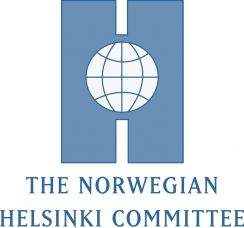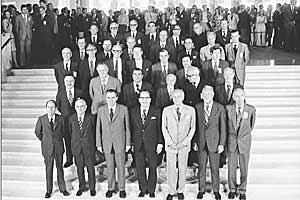The Moscow Helsinki Group (MHG) was founded in 1976 and its purpose has not changed since then, being the protection of human rights. It was established by famous physicist Yuri Orlov. He insisted on establishing a group which would see to the observation of human rights in the country. He announced its establishment at a press-conference in Academician Sakharov’s flat on the 12th of May 1976.
Group established by 11 citizens
“This was Yuri Orlov’s idea. He thought up and formed this group, encouraging people to become its members himself. He told me recently and I am very prou d of this, I was the first he asked to join the group. He spoke to people privately, calling them outside because not only our telephones but also our flats were bugged. We all realized that we were in danger of the most serious repressions. This is how 11 Soviet citizens, having no rights just like the rest of the population, established this group and all we had as our assets was two run-down typewriters”, told Alexeyeva The Voice of Russia.
d of this, I was the first he asked to join the group. He spoke to people privately, calling them outside because not only our telephones but also our flats were bugged. We all realized that we were in danger of the most serious repressions. This is how 11 Soviet citizens, having no rights just like the rest of the population, established this group and all we had as our assets was two run-down typewriters”, told Alexeyeva The Voice of Russia.
The Soviet MHG was the first Helsinki committee to be established after the 1975 Helsinki accord,s igned in 1975 by the Soviet Union, the USA, Canada and all countries of Western and Eastern Europe, except Albania, and its foundation marks the beginning of a remarkable human rights movement in history.
The MHG scrupulously registered cases of the violation of human rights and freedoms enumerated in Helsinki Agreement.
The MHG was unable to trace all violations on the territory of a country as huge as the USSR. Then, in Lithuania, Georgia, Armenia and Ukraine public organizations were created which adopted the principles and mission of the MHG. In general, human rights activists had a lot of help at that time.
Work resumed in 1989
Ever since it was established the group was subjected to constant persecution and oppression, its activities were called anti-social and hostile, and the published materials were branded as slander.
At first there were searches, interrogations, shadowing and threats. Then arrests followed. Yuri Orlov was sentenced to 7 years in a maximum security prison and 5 years of exile. All in all, 50 people were arrested. By 1982 only three members of the organization were still free. The MHG had to suspend its work.
Work resumed in 1989. Ludmila Alexeyeva became the Group’s leader in 1996. Today the organisation has partners in all Russian regions, cooperates with all international human rights organizations and always sternly criticizes the authorities. We are not in opposition but in a permanent dialogue, Ludmila Alexeyeva says:
“Opposition spells politics and we are not a political party. So we are not in opposition. We have to interact with the authorities, we force them into cooperation even if they do not want it. Our main purpose is to force the authorities to observe the Constitution and human rights and to respect our citizens’ dignity”.
Compliments
Bjørn Engesland, secretary general of the  Norwegian Helsinki Committee (NHC) has today sent a letter to Lyudmila Alexeeva, congratulating the Russian human rights organisation on its 35 years’ anniversary.
Norwegian Helsinki Committee (NHC) has today sent a letter to Lyudmila Alexeeva, congratulating the Russian human rights organisation on its 35 years’ anniversary.
According to NHC, the Helsinki committees have a particular importance in Eastern Europe and for the cooperation and solidarity between Eastern and Western human rights activists jointly forming a strong voice for human rights protection in the OSCE area. The hard work and effort of MHG and the rest of the movement is strongly needed today as it was in the cold war period.
“NHC appreciates our close, long-term cooperation with the Moscow Helsinki Group in promoting human rights. We look forward to our continued cooperation. We wish you Lyudmila, and the entire staff of the Moscow Helsinki Group, optimism in your work, fortitude, and all the best“, writes Engesland.
The OSCE Chairperson-in-Office, Lithuanian Foreign Minister, Audronius Ažubalis underlined MHG’s invaluable contribution to the development of civil society that inspired democratic changes in the former Soviet Union and Eastern Europe.
 “I have always admired the courage and devotion of each and every member of the Moscow Helsinki Group for the ideals of democracy, human rights and ‘for the service of truth and the service of liberty’,” he said.
“I have always admired the courage and devotion of each and every member of the Moscow Helsinki Group for the ideals of democracy, human rights and ‘for the service of truth and the service of liberty’,” he said.
The Helsinki Final Act, signed by presidents and prime ministers from 35 countries on 1 August 1975, was seen as a major step in reducing Cold War tensions and led to the formation of a permanent forum for dialogue on security – the Conference on Security and Co-operation in Europe, now the OSCE – and motivated the establishment of Helsinki groups.





